As sustainable travel becomes a global priority, many travelers are seeking eco-friendly and safe alternatives for their gear. One often overlooked yet essential item is non-toxic luggage. In this guide, we’ll explore why non-toxic luggage is an important choice, what risks toxic materials pose, and how to select the safest and most sustainable options for your travels.
Why Choose Non-Toxic Luggage?
Non-toxic luggage offers more than just an eco-friendly label; it safeguards your health, supports ethical manufacturing, and aligns with sustainable travel goals. Here’s why it’s worth the investment:
1. Health Benefits
Many traditional luggage options contain harmful chemicals like polyvinyl chloride (PVC), phthalates, BPA, and formaldehyde, which can leach into the environment and potentially impact your health. Non-toxic luggage eliminates these risks, providing a safer choice for you and your family.
2. Environmental Responsibility
Toxic materials in luggage contribute to plastic pollution, chemical runoff, and non-biodegradable waste. Choosing non-toxic options reduces your carbon footprint and supports the use of renewable and sustainable materials like organic cotton, recycled plastics, or ethically sourced leather.
3. Ethical Manufacturing
Non-toxic luggage is often produced under more ethical and sustainable standards, ensuring that workers are treated fairly and production processes minimize harm to the planet. This adds a layer of responsibility to your purchase.
4. Longevity and Quality
Many non-toxic options are crafted with durability in mind, using high-quality, sustainable materials that last longer. This reduces waste and ensures your luggage can withstand years of travel.
The Best Non-Toxic Luggage Brands in 2025
Choosing the right luggage involves more than just aesthetics and functionality. The best non-toxic luggage brands offer products that are free from harmful chemicals, crafted with sustainable materials, and designed to last.
Monos: Best Overall
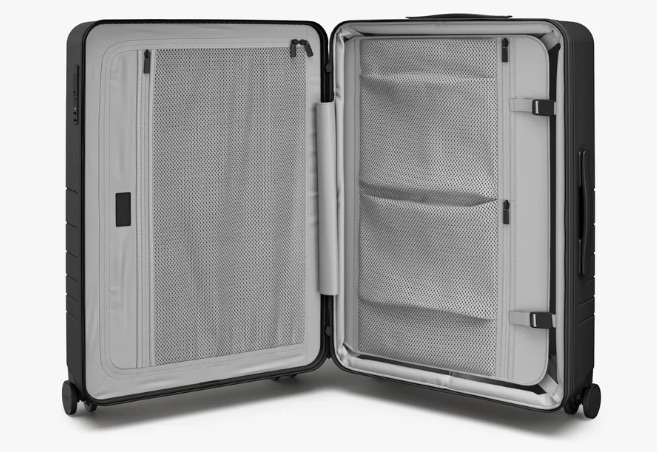
Monos has become a standout name in the world of luggage, offering sleek, minimalist designs that cater to frequent travelers seeking style and durability. But beyond aesthetics, Monos also champions eco-friendly practices, making their products a compelling choice for those prioritizing sustainability without sacrificing quality.
Product Highlights
Monos luggage is crafted with a thoughtful balance of performance and eco-consciousness. Their hard-shell suitcases, like the Monos Carry-On Pro, feature a polycarbonate shell that is durable, lightweight, and recyclable. The brand also emphasizes ethical manufacturing, using materials free of harmful chemicals and ensuring fair labor practices. This luggage is designed for both short getaways and long-haul adventures, with a host of features that cater to modern travel needs.
Performance and Materials
Durability:
Monos luggage is built to withstand rough handling, with its aerospace-grade polycarbonate shell offering excellent impact resistance. This makes it a reliable companion for travelers navigating unpredictable conditions, from cobblestone streets to bustling airport terminals.
Eco-Friendliness:
The polycarbonate used is not only recyclable but also produced in facilities committed to reducing waste and emissions. Monos uses water-based adhesives and non-toxic finishes, ensuring the luggage aligns with eco-conscious values.
Design Features:
- Smooth Telescopic Handle: Ergonomically designed with multiple height settings for comfort.
- Whisper-Quiet Wheels: 360-degree spinner wheels ensure smooth maneuverability.
- Thoughtful Interior: Includes compression panels, vegan leather accents, and an anti-microbial interior fabric to keep your belongings fresh.
Suitability:
The luggage comes in various sizes, from compact carry-ons to spacious check-in options, making it versatile for all types of travel. Its design, focused on both functionality and aesthetics, suits everyone from minimalist solo travelers to families.
Pros:
- Environmentally Safe Materials: Recyclable polycarbonate and non-toxic finishes.
- Durable Construction: Resistant to dents and scratches while remaining lightweight.
- Organizational Features: Interior compartments and compression straps optimize packing space.
- Warranty: Comprehensive lifetime warranty reflects the brand’s confidence in its quality.
- Stylish Design: Minimalist yet striking, available in a range of colors.
Cons:
- Price Point: Premium quality comes with a higher price tag, which might not suit budget-conscious travelers.
- Weight: While durable, the hard shell can be slightly heavier compared to some ultralight alternatives.
- Limited Expandability: Unlike some other luggage brands, Monos prioritizes a sleek design over expandable compartments
Top Picks
- Monos Carry-On Pro:
- Features a built-in front compartment for electronics.
- Lightweight yet extremely durable, perfect for short trips.
- Monos Check-In Large:
- Offers spacious packing capacity while maintaining structural integrity for long-haul travel.
Paravel Luggage
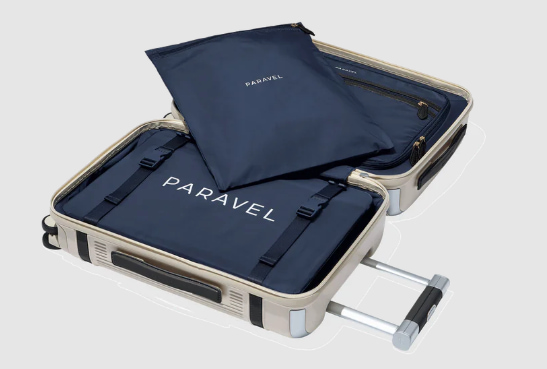
Paravel luggage stands out as a stylish and sustainable travel companion designed for eco-conscious adventurers. Combining thoughtful design with eco-friendly materials, this luggage line makes it easy to travel light while leaving a lighter footprint on the planet.
- Eco-crafted materials: Made from recycled polycarbonate and upcycled plastic bottles.
- Durable design: Scratch-resistant, water-resistant, and built to withstand heavy use.
- Lightweight structure: Streamlined for easy mobility without compromising storage space.
- Thoughtful features: TSA-approved locks, smooth 360° spinner wheels, and an adjustable handle.
- Vegan leather accents: Elegant trims enhance aesthetics without relying on animal-derived materials.
- Carbon-neutral production: Emphasizes sustainable manufacturing and shipping practices.
Paravel luggage strikes a perfect balance between functionality and sustainability. The hard-shell exterior, crafted from 100% recycled polycarbonate, resists scratches and ensures durability during transit. Meanwhile, the interior lining, made from recycled plastic bottles, feels soft to the touch while further reducing waste. These eco-friendly materials showcase Paravel’s commitment to sustainability without sacrificing quality or elegance.
Performance-wise, the luggage glides effortlessly on its 360° spinner wheels, making it an ideal choice for both quick trips and long-haul journeys. The TSA-approved locks add a layer of security, while the lightweight structure minimizes strain when lifting or maneuvering through airports. Paravel’s thoughtful features—like a well-organized interior with compression straps and mesh pockets—make packing intuitive and efficient.
For travelers prioritizing aesthetics, Paravel does not disappoint. The clean lines, vegan leather details, and color options exude sophistication. Its carbon-neutral approach, from production to shipping, will resonate with those striving to minimize their environmental impact.
Pros:
- High-quality, recycled materials with a sleek design.
- Carbon-neutral and environmentally conscious production.
- Lightweight and easy to maneuver.
- TSA-approved locks and ample interior organization.
- Durable enough for frequent travelers.
Cons:
- Premium pricing may not fit all budgets.
- Limited size options for those needing very large luggage.
- Hard-shell design may not offer as much flexibility as soft-sided alternatives.
Top Picks
- Aviator Carry-On Plus:
- Constructed from recycled polycarbonate with aluminum handles and vegan leather trim.
- Features a sleek design and spacious interior, ideal for weekend getaways.
- Cabana Tote:
- Made from organic cotton canvas, this versatile bag works as a carry-on or a stylish day bag.
- Grand Tour Duffle:
- Crafted with water-resistant recycled canvas and non-toxic finishes, perfect for short trips or as a gym bag.
Solgaard Luggage: Sustainable Travel Redefined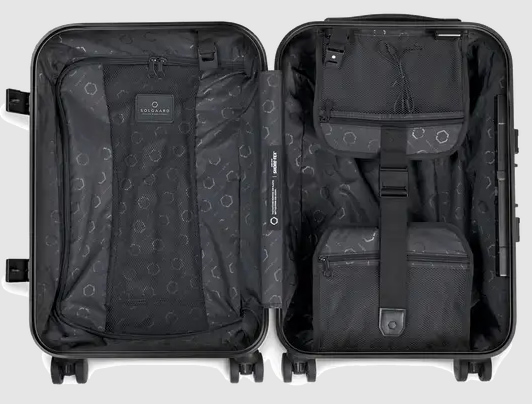
Solgaard luggage has made a name for itself in the travel industry by emphasizing sustainability, innovation, and durability. Designed for modern travelers, the brand promises functionality without compromising on eco-conscious principles. This review evaluates the key aspects of Solgaard’s luggage, including its environmental impact, design features, and usability.
Environmental Impact and Sustainability
Solgaard’s commitment to sustainability is evident in its material choices and production practices. The luggage is made from Shore-Tex™, a proprietary fabric crafted from recycled ocean-bound plastic. According to the company, each piece helps remove approximately 5 pounds of plastic waste from oceans, making it a meaningful choice for eco-conscious consumers.
Additionally, the brand partners with The Plastic Bank, an organization that works to clean up ocean-bound plastic and support recycling efforts in developing communities. Solgaard’s B Corp certification reinforces its dedication to environmental and social responsibility.
Design and Functionality
Solgaard luggage is designed with practicality and durability in mind. Some standout features include:
- Hard-Shell Construction: Their suitcase lines, such as the Carry-On Closet, boast a polycarbonate exterior that provides robust protection for your belongings.
- Integrated Shelving System: The Carry-On Closet includes an innovative removable shelving system, allowing travelers to organize and access items easily.
- USB Charging Capability: Many Solgaard luggage pieces feature integrated USB ports for on-the-go charging, catering to tech-savvy travelers.
Terra Thread Bags
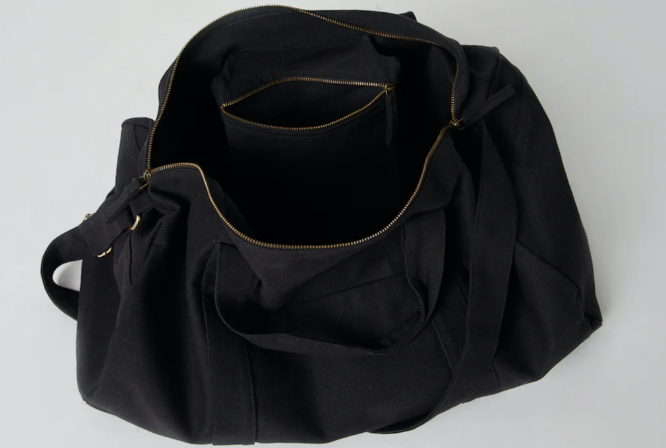
Terra Thread is known for its commitment to sustainability, and their luggage line exemplifies eco-friendly innovation in the travel industry. This review delves into the materials, ethical practices, and functional design of Terra Thread Luggage to assess its value as a non-toxic, environmentally conscious option for travelers.
Terra Thread Luggage is crafted using GOTS-certified organic cotton, ensuring that the material is free from harmful chemicals typically associated with conventional cotton production. Organic cotton reduces water usage and avoids pesticides, making it a more sustainable choice. The brand also partners with Fair Trade organizations, guaranteeing ethical labor practices and fair wages throughout their supply chain.
One standout feature of Terra Thread Luggage is its commitment to carbon neutrality. The company offsets carbon emissions generated during manufacturing and transportation, which is particularly relevant for eco-conscious consumers. Additionally, Terra Thread products are shipped in plastic-free packaging, further aligning with their low-impact philosophy.
The luggage itself combines minimalist aesthetics with practicality. It features ample compartments for organized packing, sturdy zippers, and reinforced stitching for durability. While the organic cotton fabric is not as water-resistant as synthetic materials, it provides enough resilience for most travel needs. The natural color palette and timeless design are appealing for travelers looking for a classic, versatile piece of luggage.
Pros and Cons
Pros:
- Made from GOTS-certified organic cotton, ensuring a non-toxic, eco-friendly material.
- Fair Trade certified, supporting ethical labor practices.
- Carbon-neutral manufacturing and transportation.
- Plastic-free packaging reduces environmental waste.
- Timeless design with a focus on functionality.
Cons:
- Limited water resistance compared to synthetic materials.
- May require more care to keep the organic cotton fabric clean.
- Higher price point than conventional luggage, reflecting its sustainable and ethical production.
Lo & Sons Luggage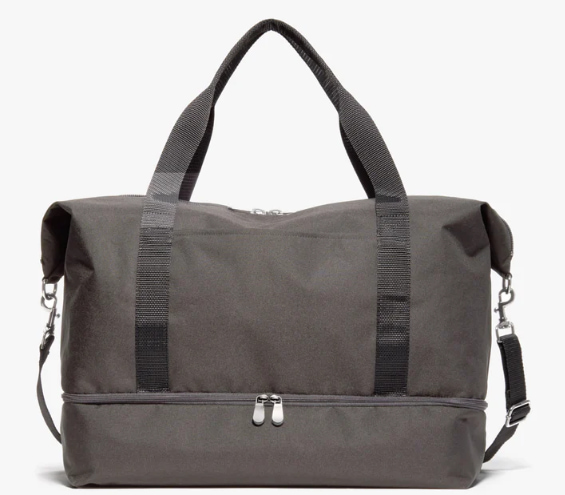
Lo & Sons is a brand renowned for its elegant, functional, and eco-friendly luggage designed for the modern traveler. Their products are a blend of sleek aesthetics and thoughtful sustainability, making them a popular choice for environmentally conscious consumers. In this review, we will evaluate the design, functionality, environmental impact, and overall value of Lo & Sons luggage.
Design and Functionality
Lo & Sons luggage is thoughtfully crafted with travelers in mind. Their suitcases and travel bags are lightweight yet durable, with features like multiple compartments, padded laptop sleeves, and organizational pouches that make packing and accessing essentials easy. The designs are minimalist and stylish, appealing to those who prioritize both form and function.
Key features include:
- Smooth-glide zippers and spinner wheels for effortless maneuverability.
- Adjustable straps and reinforced handles for carrying comfort.
- Water-resistant fabrics that protect your belongings from unexpected weather.
These thoughtful details make Lo & Sons luggage ideal for frequent flyers, weekend adventurers, and business travelers.
Environmental Impact
Lo & Sons stands out for its commitment to sustainability. Many of their products are crafted from recycled and environmentally safe materials, such as:
- Recycled Polyethylene Terephthalate (rPET): Derived from recycled plastic bottles, this material is used in the lining and exterior of some bags.
- Organic Cotton: A renewable resource that minimizes the use of harmful chemicals in production.
- Certifications: Lo & Sons partners with Bluesign-certified mills to ensure that their fabrics meet high environmental and safety standards.
Additionally, their manufacturing process emphasizes waste reduction and energy efficiency. By prioritizing sustainable materials and ethical practices, Lo & Sons helps reduce the environmental footprint associated with travel.
Durability and Performance
Despite the eco-friendly materials, Lo & Sons luggage is designed for longevity. The sturdy construction ensures that these bags can withstand the rigors of frequent travel, from airport handling to long-term use. Customers consistently praise the quality and resilience of the brand’s offerings, which can rival those of traditional luggage manufacturers.
Value and Pricing
Lo & Sons luggage sits at a higher price point, but the investment is justified by its durability, functionality, and eco-conscious design. While not the most affordable option on the market, the long-term value, coupled with the brand’s sustainability efforts, makes it an excellent choice for consumers who are willing to pay a premium for quality and ethics.
Pros:
- Thoughtfully designed with travelers’ needs in mind.
- Made from sustainable materials like recycled plastics and organic cotton.
- Durable construction suitable for frequent travel.
- Sleek, minimalist aesthetic with versatile styling options.
- Commitment to ethical manufacturing practices.
Cons:
- Higher price point may not suit budget-conscious travelers.
- Limited availability of certain styles and sizes compared to larger luggage brands.
Patagonia Eco-Friendly Duffels
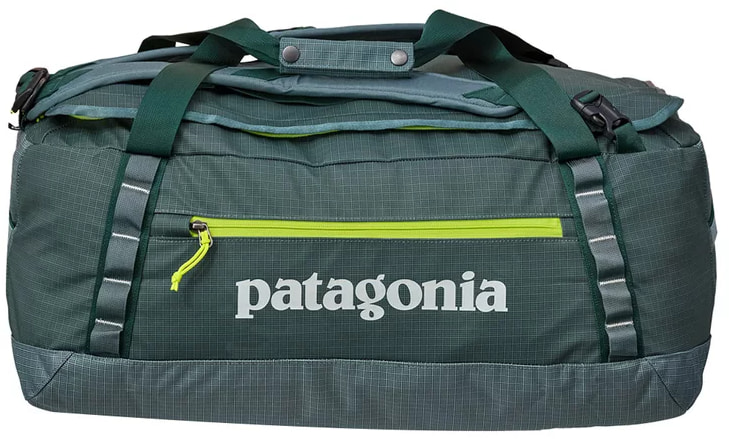
When it comes to blending sustainability, durability, and style, Patagonia duffels stand out as a premium choice for environmentally conscious adventurers and commuters alike. Crafted with eco-forward materials and an emphasis on functionality, these backpacks are designed to minimize environmental impact without compromising on quality.
Key Features
- Recycled Materials: Made primarily from recycled polyester and nylon, reducing reliance on virgin resources.
- PFC-Free DWR Coating: Durable water repellent that avoids harmful perfluorinated chemicals.
- Fair Trade Certified™ Sewing: Ensures ethical labor practices in the production process.
- Lightweight Yet Durable Design: Built to withstand daily wear and tear or outdoor excursions.
- Versatile Compartments: Thoughtfully designed pockets for laptops, water bottles, and other essentials.
- Climate-Neutral Practices: Part of Patagonia’s commitment to becoming carbon neutral across its entire business.
Performance and Sustainability
Patagonia’s duffels excel in providing a reliable, eco-conscious solution for those on the go. The use of recycled polyester and nylon means fewer plastics and textiles end up in landfills, and the PFC-free water-repellent coating is a thoughtful touch that keeps belongings dry without releasing toxic chemicals into the environment. Whether you’re navigating city streets or hitting the trails, the fabric is robust and resistant to abrasion.
The ergonomic design prioritizes comfort, with padded shoulder straps and a breathable back panel that reduce strain during extended use. Inside, the organizational layout is intuitive, featuring compartments tailored for modern needs, such as padded sleeves for laptops and dedicated slots for smaller items. These backpacks are spacious enough for a day’s worth of gear while maintaining a sleek profile.
Patagonia’s commitment to sustainability extends beyond materials. By opting for Fair Trade Certified™ sewing, the company ensures fair wages and safe working conditions for the people making these products. Additionally, the brand offsets the carbon footprint of its manufacturing processes, aligning with its broader mission to protect the planet.
Pros:
- High-quality materials derived from recycled sources.
- Ethical production practices with Fair Trade certification.
- PFC-free water-repellent finish is effective and safer for the environment.
- Comfortable for long wear, even with heavy loads.
- Versatile designs suitable for commuting, travel, or outdoor use.
- Patagonia’s ironclad warranty backs each product.
Cons:
- Higher price point compared to less sustainable alternatives.
- Limited range of color options for some models.
- Heavier than ultralight backpack options on the market.
Bixbee: Non-Toxic Options for Kids
Bixbee is a brand dedicated to creating innovative, non-toxic, and ergonomically designed products for children. Known primarily for their backpacks, lunchboxes, and accessories, Bixbee emphasizes safety, functionality, and environmental responsibility in their offerings. This review explores their product lineup to determine how well they align with non-toxic and eco-friendly standards.
Material Composition and Safety
Bixbee products are made with kid-safe materials that are free from harmful chemicals such as BPA, PVC, and phthalates. These materials are carefully selected to ensure safety for children while maintaining durability and ease of use. The absence of toxic substances makes these items an excellent choice for parents seeking healthier options for their kids.
Sustainability Practices
Bixbee has taken steps to reduce their environmental footprint. Their backpacks are often designed with lightweight, water-resistant polyester, some of which incorporate recycled materials. While not all products feature certifications like Global Recycled Standard (GRS), the company’s commitment to integrating eco-conscious practices is evident in their materials and production processes.
Additionally, Bixbee operates a “One Here. One There.” program, where for every backpack purchased, the company donates a schoolbag filled with supplies to a child in need. This initiative promotes social sustainability by addressing educational inequities and reducing waste by focusing on high-quality, long-lasting designs.
Functionality and Ergonomics
Bixbee backpacks stand out for their ergonomic design, tailored to fit young children’s bodies. The compact size and padded straps help distribute weight evenly, reducing strain on developing spines. Features like multiple compartments, easy-to-clean surfaces, and playful designs ensure these products are not only safe and sustainable but also practical and fun for kids to use.
Design and Aesthetic Appeal
Bixbee products are vibrant, whimsical, and tailored to appeal to children. From winged designs to animal-themed patterns, the brand captures kids’ imaginations while ensuring functionality. Their lunchboxes and accessories complement the backpacks, offering coordinated sets that are as practical as they are visually appealing.
Pros:
- Non-toxic materials free from BPA, PVC, and phthalates.
- Ergonomic design tailored for children.
- Playful, child-friendly designs with practical features.
- Commitment to social responsibility through the “One Here. One There.” program.
- Durable and water-resistant construction.
Cons:
- Limited third-party certifications for non-toxic materials.
- Not all products use recycled or biodegradable materials.
- Room for improvement in transparency about sourcing practices.
Samsonite Luggage
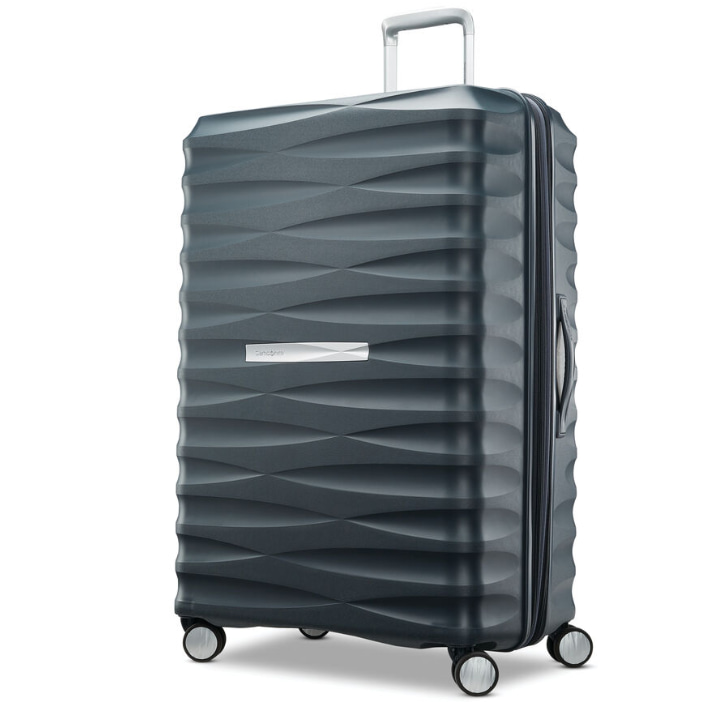
Samsonite is a globally renowned brand known for its high-quality luggage and travel accessories. Offering a wide range of products, including carry-ons, checked bags, and travel backpacks, Samsonite is a trusted choice for durability and functionality. This review evaluates the brand’s commitment to non-toxic and eco-friendly practices alongside its overall performance.
Material Composition and Safety
Samsonite primarily uses materials like polycarbonate, polyester, and polypropylene in its luggage designs. While these materials are selected for durability and impact resistance, they are not inherently eco-friendly or biodegradable. However, Samsonite has recently begun integrating recycled materials into some of its product lines. For example, the ECO-Advance and ECO-Nu collections incorporate recycled PET (rPET) plastics, which reduce reliance on virgin materials.
Although Samsonite does not emphasize non-toxic certifications in its marketing, the company adheres to industry standards for safe material usage, ensuring their products are free from harmful substances such as lead or phthalates.
Sustainability Practices
Samsonite has taken notable steps to address sustainability in recent years. The Recyclex™ fabric technology, used in some of their eco-conscious collections, is made from 100% post-consumer recycled PET bottles. Additionally, Samsonite is working to reduce its environmental footprint by optimizing packaging, improving energy efficiency in manufacturing, and offering repair services to extend the life of its products.
Despite these initiatives, many of Samsonite’s standard product lines still rely on traditional plastics and synthetic fabrics. Expanding eco-conscious practices across their entire catalog could solidify their standing as a leader in sustainable travel gear.
Durability and Functionality
Samsonite luggage is highly regarded for its durability and functionality. The hard-shell luggage options, often made from polycarbonate, provide excellent impact resistance, while soft-sided luggage is lightweight and flexible for easier storage. Features like TSA-approved locks, spinner wheels, and expandable compartments add to the convenience and user-friendliness of their products.
Additionally, Samsonite offers a wide variety of sizes and styles to cater to different travel needs. Whether for short business trips or extended vacations, travelers can find a bag that suits their specific requirements.
Design and Aesthetic Appeal
Samsonite balances practicality with modern, sleek aesthetics. Their hard-shell luggage often features minimalist designs with matte or glossy finishes, while their soft-sided options include more versatile and professional looks. Eco-conscious collections like ECO-Advance also maintain a polished appearance, proving that sustainability does not have to compromise style.
Pros:
- Durable and reliable construction for long-term use.
- Eco-conscious collections featuring recycled materials (e.g., Recyclex™ fabric).
- Wide variety of styles, sizes, and features to suit different travel needs.
- Repair services available to extend product lifespan.
- Modern and professional designs.
Cons:
- Many products still rely on traditional plastics and synthetic materials.
- Limited use of biodegradable or natural alternatives.
- Transparency about sourcing and sustainability practices could be improved.
- Green options are not yet widely available across all collections.
MVST Luggage
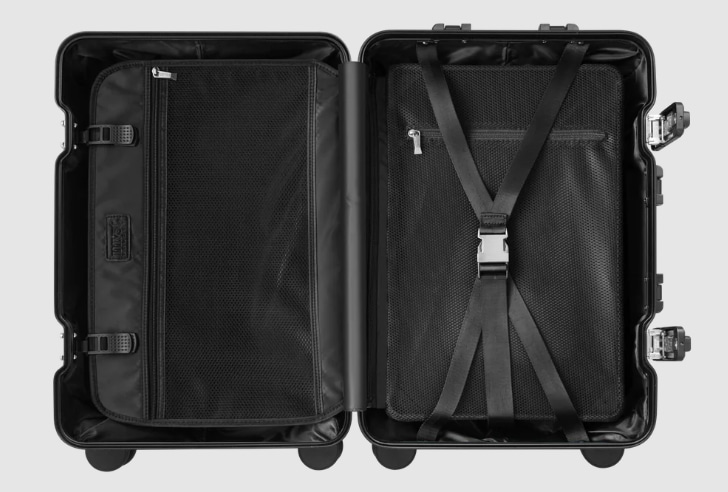
MVST Luggage promises to redefine the way you pack and move, combining modern aesthetics with eco-conscious design. But does it live up to its mission? Here’s a closer look.
- Eco-Friendly Materials: Crafted with recycled aluminum alloy and polycarbonate, MVST luggage minimizes environmental impact without compromising durability.
- Non-Toxic Coatings: Free from harmful chemicals, ensuring the suitcase is safe for both you and the planet.
- Modular Design: Designed for repairability, parts like wheels and handles can be replaced, extending the life of the luggage.
- Lightweight Yet Sturdy: Combines lightweight construction with impressive strength for easy handling and resilience.
- Thoughtful Details: TSA-approved locks, silent spinner wheels, and a well-organized interior make this luggage travel-ready.
A Suitcase for the Eco-Minded Adventurer
MVST luggage is clearly designed for travelers who value sustainability as much as style. Its materials set it apart from traditional options, with the outer shell boasting a recycled aluminum and polycarbonate blend. This offers the best of both worlds: an ultra-durable, impact-resistant suitcase that is also lightweight.
Inside, the compartments are impressively practical. The fabric lining is made from recycled PET bottles, ensuring even the interior aligns with the eco-conscious ethos. The thoughtful organizational features, like adjustable compression straps and mesh zippered pockets, make packing efficient, whether for a weekend trip or a long-haul journey.
The modular approach to repairs is where MVST truly shines. Unlike many luggage brands that encourage replacement over repair, MVST offers spare parts for common wear items like wheels and zippers. This not only extends the suitcase’s lifespan but also reduces waste—a major win for the environment.
Real-World Usability
For frequent flyers, MVST luggage performs admirably. The smooth spinner wheels glide effortlessly through airports, and the TSA-approved locks provide peace of mind during check-ins. However, travelers with larger families or extensive packing needs may find the interior slightly limited, as the compartments are optimized for organized packing rather than sheer volume.
One notable downside is the price point. While the safe materials and modular design justify a higher cost, it might not be accessible for budget-conscious travelers. Additionally, the aluminum alloy finish is prone to minor scratches, which could be a concern for those who prefer their luggage to look pristine.
Pros
- Sustainable materials and non-toxic coatings.
- Durable yet lightweight construction.
- Repairable modular design extends longevity.
- Smooth wheels and secure TSA locks.
- Stylish, modern aesthetic.
Cons
- Premium price may not suit all budgets.
- Limited capacity for bulk packers.
- Aluminum surface prone to scratches.
Quince Luggage: Affordable, Sustainable, and Sophisticated
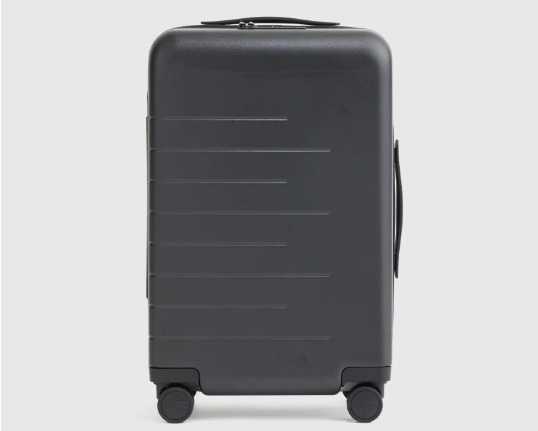
Quince luggage has made waves in the travel accessories market by offering premium-quality products at accessible prices. With a focus on sustainability, high functionality, and minimalist design, Quince aims to provide an option for travelers who want value without compromising on style or environmental impact.
Materials and Construction
Quince luggage is crafted from a polycarbonate shell, known for being lightweight and impact-resistant. Unlike many competitors, Quince incorporates recycled materials in its construction, including recycled polycarbonate for select models. This makes their products more environmentally friendly than those using virgin plastics.
The luggage also features a TSA-approved lock, Hinomoto spinner wheels for smooth maneuverability, and an ergonomic telescopic handle. These elements contribute to a durable and functional design that withstands the demands of modern travel.
Sustainability Efforts
Quince places a strong emphasis on sustainability. Its use of recycled materials reduces reliance on virgin resources, and the brand is transparent about its supply chain practices. By focusing on direct-to-consumer pricing, Quince also minimizes excess packaging and unnecessary carbon emissions associated with traditional retail distribution.
Additionally, Quince partners with certified factories that adhere to ethical labor and environmentally conscious practices. This alignment with sustainability and ethical standards makes the brand a strong choice for eco-conscious travelers.
Functionality and Features
Quince luggage is designed with practicality and convenience in mind, offering:
- Expandable Compartments: Allow for additional packing space when needed.
- Compression Straps: Help maximize packing efficiency and keep items secure.
- Quiet Spinner Wheels: Ensure smooth and noise-free navigation through airports or crowded spaces.
- TSA-Approved Lock: Adds a layer of security without sacrificing convenience.
The interior of the luggage is thoughtfully organized with multiple compartments and a removable laundry bag, making it easy to separate and access items during your journey.
Environmental Considerations
Quince stands out for its commitment to sustainability. By using recycled polycarbonate and partnering with factories that follow ethical and eco-friendly standards, Quince positions itself as a greener alternative in the luggage industry. The brand’s efforts to reduce costs and excess waste further highlight its dedication to a more sustainable future.
Pros:
- Made with recycled polycarbonate, reducing environmental impact.
- Direct-to-consumer pricing offers excellent value for money.
- Thoughtful design with expandable compartments and compression straps.
- Quiet spinner wheels and ergonomic handle enhance travel convenience.
- Transparent supply chain with a focus on ethical and sustainable practices.
Cons:
- Limited size and style options compared to some competitors.
- Less established brand, which may raise questions about long-term durability.
- No integrated USB charging option like some higher-end brands.
Cuyana Travel Bags: Timeless Elegance with a Sustainable Edge
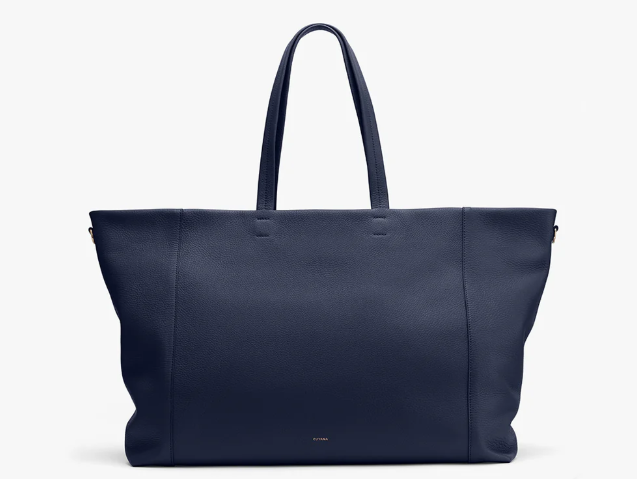
Cuyana, a brand synonymous with minimalist design and sustainable luxury, has extended its philosophy to travel accessories with its thoughtfully designed luggage. Known for its high-quality craftsmanship and commitment to sustainability, Cuyana travel bags offer a stylish and eco-conscious choice for travelers seeking both functionality and sophistication.
Materials and Construction
Cuyana bags are crafted from premium materials such as Italian leather and durable canvas, ensuring longevity and timeless appeal. The company emphasizes sustainable sourcing, using leather that is Gold Certified by the Leather Working Group (LWG). This certification ensures that the tanning process meets stringent environmental standards, including water and energy efficiency and waste management.
The luggage is reinforced with robust stitching and high-quality zippers, combining elegance with practicality. Cuyana’s careful attention to detail is evident in every aspect of the design, from the structured silhouette to the polished hardware.
Sustainability Efforts
Cuyana is deeply committed to sustainability, operating under the ethos of “fewer, better things.” The brand prioritizes durable, high-quality products to reduce waste associated with fast fashion and disposable goods. Additionally, Cuyana’s use of LWG-certified leather and eco-friendly materials reflects its dedication to minimizing environmental impact.
The company also implements a Lean Closet initiative, encouraging customers to recycle or donate unused items. This program aligns with Cuyana’s mission to promote mindful consumption and reduce overall waste.
Functionality and Features
Cuyana bags are designed to meet the needs of modern travelers without sacrificing style. Key features include:
- Multiple Compartments: Provide ample space for organizing essentials.
- Structured Design: Ensures the bag maintains its shape, even when fully packed.
- Lightweight Construction: Despite its premium materials, Cuyana luggage is designed to be lightweight for ease of transport.
- Timeless Aesthetic: The minimalist design transitions seamlessly from business to leisure travel.
While Cuyana’s luggage leans more toward luxury weekender bags and carry-ons than hard-shell suitcases, its focus on quality and versatility makes it a standout choice for short trips or as a stylish companion to larger luggage.
Environmental Considerations
Cuyana’s sustainability initiatives extend beyond its materials. The brand’s emphasis on creating long-lasting, versatile products aligns with eco-friendly principles, reducing the need for frequent replacements. By advocating for conscious consumerism and supporting ethical manufacturing practices, Cuyana contributes positively to the sustainability movement in fashion and accessories.
Pros:
- High-quality materials, including LWG-certified leather, ensure durability and sustainability.
- Elegant, minimalist design suitable for a range of travel scenarios.
- Lightweight and thoughtfully structured for practicality.
- Commitment to sustainable practices, including the Lean Closet initiative.
- Ethical sourcing and transparent manufacturing processes.
Cons:
- Limited selection of sizes and styles, focused more on carry-ons and weekenders.
- Higher price point may not be accessible to all travelers.
- Not ideal for those seeking hard-shell luggage or built-in tech features.
Tiradia Cork Bags and Duffel
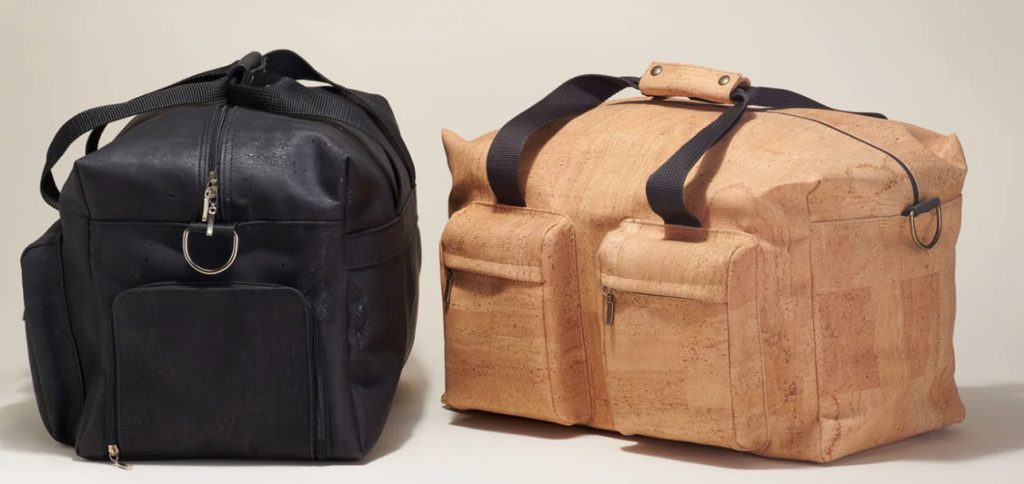
Tiradia Cork Bags and Duffels blend sustainability with practicality, offering eco-conscious travelers and everyday users a stylish and responsible way to carry their essentials. Crafted from natural cork, these bags prioritize durability, function, and aesthetics in a way that aligns with ethical and environmental values.
Key Features
- Sustainable Cork Material: Made from 100% natural, renewable cork, harvested without damaging the trees or ecosystem.
- Water-Resistant and Durable: Cork’s natural resilience ensures that the bags repel water and resist wear, even with regular use.
- Lightweight Construction: Easy to carry, even when packed full, making them ideal for travel or daily use.
- Vegan and Cruelty-Free: Free from animal products and ethically produced for a conscious lifestyle.
- Timeless Aesthetic: A minimalist, earthy design that suits a variety of styles and occasions.
Ideal for Eco-Friendly Travelers and Everyday Use
Tiradia Cork Bags and Duffels are versatile and designed for those who value sustainable products that don’t compromise on utility. Their duffel bags are perfect for short getaways or gym trips, while the smaller bags, such as totes or backpacks, cater to daily commuting, shopping, or casual outings.
The natural cork material offers a striking yet subtle texture that elevates the visual appeal of each bag. Moreover, cork is incredibly lightweight, making these products a pleasure to use, especially for those always on the go. With spacious compartments and thoughtful designs, the bags are as practical as they are sustainable.
Pros:
- Sustainable and renewable cork material.
- Water-resistant and easy to clean.
- Lightweight yet robust, suitable for heavy use.
- Vegan and free from toxic chemicals.
- Modern and versatile design with natural charm.
Cons:
- Cork’s natural finish may not appeal to those seeking bold, colorful designs.
- Limited availability of compartments compared to high-tech synthetic bags.
- Price may be higher than mass-produced synthetic alternatives.
SteamLine Luggage
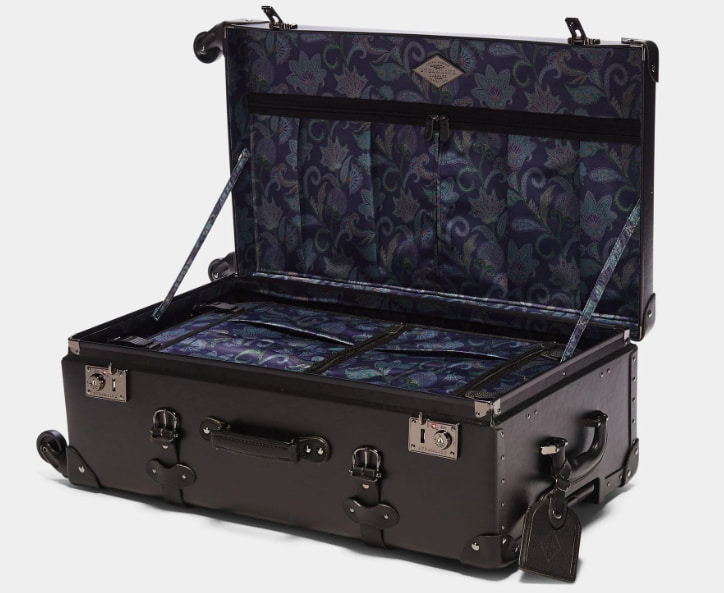
SteamLine Luggage offers a stunning blend of vintage-inspired aesthetics and modern functionality, designed for travelers who want to make a sustainable style statement. Known for their handcrafted, eco-conscious approach, these suitcases and trunks exude timeless charm while meeting the demands of contemporary globetrotters.
Key Features
- Eco-Conscious Craftsmanship: Made with sustainably sourced materials, including vegan leather and durable linings.
- Timeless Vintage Design: Inspired by classic travel trunks, each piece has distinctive details like metal corner protectors and polished hardware.
- Modern Functionality: Equipped with TSA-approved locks, smooth-rolling wheels, and telescopic handles for effortless travel.
- Customizable Interiors: Thoughtful compartments, straps, and dividers keep your belongings secure and organized.
- Handcrafted Quality: Each piece is meticulously crafted to ensure longevity and elegance.
Perfect for Sophisticated, Eco-Minded Travelers
SteamLine Luggage appeals to individuals who want their luggage to reflect their values and sense of style. These pieces are perfect for both business and leisure travel, offering a unique combination of practical features and artistic craftsmanship. The use of safe materials like vegan leather and recyclable components ensures that travelers can pack in style without compromising sustainability.
The luggage is designed with convenience in mind, featuring multidirectional wheels for smooth maneuvering and spacious interiors to accommodate various travel needs. Despite their vintage look, these suitcases are fully equipped for modern travel, making them equally suited for airport dashes and picturesque train rides.
Pros:
- Sustainable materials and ethical production.
- Stunning vintage design that stands out.
- Durable and built for long-term use.
- Modern features like TSA locks and multidirectional wheels.
- Spacious interiors with customizable compartments.
Cons:
- Premium pricing may not fit every budget.
- Vintage-style exterior may show wear more visibly over time.
- Heavier than minimalist, ultra-lightweight luggage options.
Comparing Best Non-Toxic Luggage Brands
| Brand | Key Features | Pros | Cons | Top Picks |
|---|---|---|---|---|
| Monos | Sleek, minimalist design, eco-friendly materials, polycarbonate shell, ergonomic handles, quiet wheels | – Durable and lightweight materials – Eco-friendly manufacturing – Lifetime warranty |
– Higher price point – Slightly heavier than ultralight options – Limited expandability |
– Monos Carry-On Pro – Monos Check-In Large |
| Paravel | Recycled polycarbonate, TSA-approved locks, smooth spinner wheels, vegan leather accents | – Stylish and sustainable – Lightweight – Carbon-neutral production – Durable |
– Premium pricing – Limited size options – Hard-shell may lack flexibility |
– Aviator Carry-On Plus – Cabana Tote – Grand Tour Duffle |
| Solgaard | Shore-Tex™ made from ocean-bound plastic, hard-shell with shelving system, USB charging | – Innovative shelving system – Durable and sustainable materials – USB charging capability |
– Niche design may not suit all travelers – Higher cost |
– Solgaard Carry-On Closet |
| Terra Thread | GOTS-certified organic cotton, Fair Trade certified, carbon-neutral manufacturing | – Eco-friendly organic materials – Ethical labor practices – Plastic-free packaging |
– Limited water resistance – Higher price – Requires more maintenance |
– Terra Thread Classic Organic Duffle |
| Lo & Sons | Recycled materials, lightweight and water-resistant, sleek design, padded compartments | – Sustainable and durable – Stylish and functional – Ethical production |
– Expensive – Limited style and size availability |
– Catalina Deluxe Tote – Hanover Deluxe Backpack |
| Patagonia | Recycled polyester and nylon, PFC-free DWR coating, Fair Trade Certified™ sewing, ergonomic design | – Sustainable materials – Ethical production – Water-resistant – Comfortable for long wear |
– Heavier than ultralight backpacks – Limited color options |
– Black Hole Duffel – Arbor Roll-Top Pack |
Understanding the Risks of Toxic Luggage Materials
Conventional luggage often incorporates synthetic materials and chemical treatments to improve durability, water resistance, or aesthetic appeal. However, these materials come with significant health and environmental drawbacks.
1. PVC (Polyvinyl Chloride)
- Commonly used in hard-shell luggage and coatings, PVC contains chlorine and phthalates, which can release harmful volatile organic compounds (VOCs) into the air.
- Exposure risks: Respiratory issues, endocrine disruption, and long-term health concerns.
2. Phthalates
- Found in flexible plastics and used as plasticizers, phthalates are notorious for their ability to leach out over time.
- Exposure risks: Hormonal imbalances, reproductive health issues, and developmental problems in children.
3. BPA (Bisphenol A)
- Frequently used in polycarbonate plastics for hard-shell cases, BPA has been linked to hormonal disruptions and potential carcinogenic effects.
- Exposure risks: Ingestion or inhalation through off-gassing of the luggage material.
4. Formaldehyde
- Applied in certain textile coatings or adhesives for wrinkle resistance, formaldehyde can emit toxic fumes.
- Exposure risks: Skin irritation, respiratory problems, and long-term exposure hazards.
5. Environmental Fallout
- Production of these materials releases toxins into air, water, and soil, significantly harming ecosystems and contributing to climate change.
- Disposal challenges: Most synthetic materials are non-biodegradable, leading to mounting waste in landfills.
Key Features of Non-Toxic Luggage
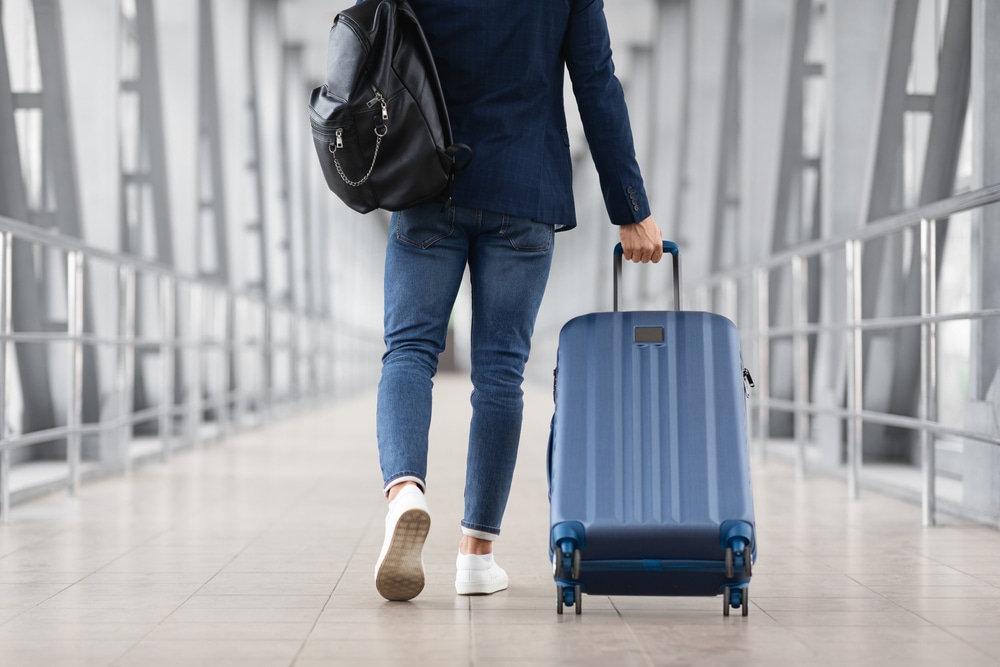
When shopping for non-toxic luggage, it’s crucial to understand the key features that ensure your travel gear is safe for your health and the environment. This section highlights the essential aspects to look for, including material safety, regulatory warnings, and certifications.
Material Safety: What to Look For
The materials used in luggage play a significant role in determining whether it is truly non-toxic. Here’s a closer look at some common materials and their safety profiles:
Polycarbonate
- Overview: Polycarbonate is a lightweight, durable plastic often used in hard-shell luggage.
- Safety Concerns: While generally regarded as safer than other plastics, polycarbonate may contain BPA unless explicitly labeled as BPA-free.
- Recommendation: Choose luggage labeled as BPA-free polycarbonate to minimize exposure to harmful chemicals.
ABS (Acrylonitrile Butadiene Styrene)
- Overview: ABS is another plastic commonly used for its affordability and impact resistance.
- Safety Concerns: It may emit low levels of VOCs during manufacturing or use.
- Recommendation: Look for brands that certify their ABS materials as low-VOC or use recycled ABS to reduce environmental impact.
Aluminum
- Overview: Aluminum luggage is a durable and stylish choice that is free from plastics and synthetic chemicals.
- Safety Concerns: Generally safe, but ensure the luggage is uncoated or uses non-toxic finishes to avoid potential exposure to harmful coatings.
- Recommendation: Opt for raw or anodized aluminum for a toxin-free experience.
Organic Fabrics
- Overview: Organic cotton, hemp, and recycled textiles are increasingly popular for soft-sided luggage.
- Safety Concerns: Ensure fabrics are GOTS-certified (Global Organic Textile Standard) to avoid exposure to pesticides, dyes, or chemical treatments.
- Recommendation: Prioritize natural fibers with eco-friendly coatings for water resistance.
Prop 65 Warning Label Explained
If you’ve ever seen the Prop 65 warning label on products, you may wonder what it means for your luggage choices. Here’s a breakdown:
What is Prop 65?
- Prop 65, officially known as the California Safe Drinking Water and Toxic Enforcement Act of 1986, requires businesses to disclose if their products contain chemicals linked to cancer, birth defects, or other reproductive harm.
- The warning often appears on products with materials like PVC, phthalates, or formaldehyde.
How to Identify Safe Luggage
- Check for the Label: If a piece of luggage carries the Prop 65 warning, it’s best to avoid it.
- Look for Manufacturer Transparency: Brands that disclose their material sources and processes are more likely to offer safe products.
- Prioritize Certifications: Seek out luggage certified by trusted organizations (e.g., OEKO-TEX, GOTS).
PFAS, Phthalates, and Other Chemicals to Avoid
Many harmful chemicals are used in conventional luggage manufacturing. Be vigilant about these key offenders:
PFAS (Per- and Polyfluoroalkyl Substances)
- Often referred to as “forever chemicals,” PFAS are used in water- and stain-resistant coatings.
- Risks: Linked to cancer, hormonal disruptions, and environmental persistence.
- How to Avoid: Look for products explicitly labeled as PFAS-free.
Phthalates
- Commonly used to soften plastics, phthalates are found in PVC and other synthetic materials.
- Risks: Hormonal imbalances and developmental issues.
- How to Avoid: Opt for PVC-free luggage.
Other Chemicals to Watch For
- Formaldehyde: Used in adhesives or fabric treatments.
- BPA: Found in certain plastics.
- Flame Retardants: Can be present in luggage linings and pose toxicity risks.
Certifications to Consider
Certifications provide assurance that your luggage meets high safety and sustainability standards. Here are the most reputable ones to look for:
1. GOTS (Global Organic Textile Standard)
- Ensures that textiles are made with organic fibers and free from harmful chemicals like pesticides and synthetic dyes.
- Ideal for soft-sided luggage made from cotton or hemp.
2. OEKO-TEX Standard 100
- Certifies that every component of a product, from fabric to thread, is free from harmful substances.
- Widely recognized in luggage made with synthetic or natural textiles.
3. Bluesign Certified
- Focuses on reducing environmental impact and ensuring that textiles and coatings are safe for human use.
- Common in eco-conscious luggage brands.
4. FSC (Forest Stewardship Council) Certification
- Verifies that wood-based materials, such as handles or trim, are sourced from responsibly managed forests.
5. Cradle to Cradle Certification
- Ensures that the product is designed for sustainability, with safe materials that can be reused or biodegraded.
How to Choose the Best Non-Toxic Luggage for Your Needs

Selecting the right non-toxic luggage is about balancing safety with practicality. Whether you’re a minimalist packer or a globe-trotting adventurer, this guide will help you identify the best option based on your preferences and needs.
Hard-Shell vs. Soft-Shell Suitcases
The choice between hard-shell and soft-shell luggage often comes down to travel style and priorities. Here’s a breakdown to help you decide:
Hard-Shell Suitcases
- Advantages:
- Durability: Made with sturdy materials like BPA-free polycarbonate or aluminum, these cases resist impacts and protect fragile items.
- Water Resistance: Hard shells provide superior protection against spills and rain.
- Ease of Cleaning: Smooth surfaces make it easier to wipe away dirt or spills.
- Non-Toxic Considerations:
- Look for hard-shell suitcases labeled BPA-free or made from recycled polycarbonate.
- Avoid those with PVC coatings or non-disclosed plastic compositions.
Soft-Shell Suitcases
- Advantages:
- Flexibility: Easier to squeeze into tight spaces like overhead bins or car trunks.
- Lightweight: Typically lighter than hard-shell options, making them easier to carry.
- Expandable Storage: Often include additional compartments and expandability for extra packing.
- Non-Toxic Considerations:
- Choose luggage made from GOTS-certified organic fabrics, recycled materials, or OEKO-TEX-approved textiles.
- Avoid models treated with PFAS for water resistance or those using formaldehyde-based adhesives.
Durability and Longevity
Investing in durable luggage reduces waste and ensures your purchase lasts for years. Here’s what to look for:
- Materials: Opt for high-quality materials like anodized aluminum, recycled polycarbonate, or heavy-duty organic canvas.
- Zippers and Hardware: Look for YKK zippers and reinforced corners or handles to withstand wear and tear.
- Reparability: Choose brands that offer repair services or sell replacement parts for wheels, zippers, and handles.
- Warranty: A robust warranty is a sign of a brand’s confidence in its product. Look for companies offering at least 5–10 years of coverage.
Weight and Portability
Whether you’re navigating airport terminals or cobblestone streets, the weight and portability of your luggage are essential considerations:
Lightweight Options
- Hard-Shell: Look for luggage made from polycarbonate or ABS for a balance of durability and weight.
- Soft-Shell: Opt for organic cotton canvas or nylon alternatives that are both light and strong.
Portability Features
- Wheels: Four spinner wheels provide 360-degree movement, making heavy luggage easier to maneuver.
- Handles: Telescopic handles with ergonomic grips reduce strain on your hands and wrists.
- Collapsibility: Some soft-shell luggage can be folded or compressed for storage, a bonus for tight living spaces.
Aesthetic and Functional Design
Your luggage should not only be safe and practical but also suit your personal style and travel needs.
Aesthetic Appeal
- Choose minimalist designs in neutral tones for a timeless look or bold colors for easy identification at baggage claim.
- Brands using natural or recycled materials often incorporate unique textures or finishes for an eco-chic appearance.
Functional Features
- Compartments: Internal dividers, compression straps, and detachable pouches keep your belongings organized.
- Laptop Sleeves: Ideal for business travelers or digital nomads who need to carry electronics securely.
- Locks: Look for TSA-approved locks to balance security with convenience.
- Water Resistance: Ensure your luggage is treated with non-toxic coatings or uses naturally water-resistant materials like waxed canvas.
Types of Non-Toxic Luggage
When traveling, choosing non-toxic luggage options is essential for reducing your exposure to harmful chemicals while ensuring durability, practicality, and eco-friendliness. Below is a comprehensive look at various types of non-toxic luggage, including their benefits and key considerations for making a safe and sustainable choice.
Hard-Shell Suitcases
Hard-shell suitcases are popular for their durability and ability to protect fragile items. When selecting a non-toxic hard-shell suitcase, pay attention to the following:
- Materials: Look for options made from BPA-free polycarbonate, recycled ABS plastic, or aluminum. These materials avoid harmful chemicals commonly found in conventional plastics.
- Certifications: Choose suitcases certified for low VOC emissions, ensuring that they won’t off-gas toxins into the air.
- Eco-friendly Coatings: Some brands use water-based finishes or coatings free from PVC and other toxic additives.
Pros:
- Excellent durability and protection.
- Water-resistant and easy to clean.
- Long-lasting materials reduce waste.
Popular Non-Toxic Brands:
- Samsonite ECO collections: Made with recycled materials.
- Paravel Aviator: Crafted from recycled polycarbonate and aluminum.
Organic Duffel Bags
Duffel bags made from organic materials offer a flexible, lightweight, and safe alternative for travel.
- Materials to Look For: Certified organic cotton, hemp, or canvas treated with non-toxic dyes and finishes.
- Durability: Reinforced stitching and sturdy handles ensure these bags withstand wear and tear.
- Eco-Friendly Features: Many options are biodegradable or made with recycled fabrics.
Pros:
- Lightweight and versatile.
- Easy to pack into tight spaces.
- Chemical-free and sustainable.
Popular Non-Toxic Brands:
- Terra Thread: Fairtrade-certified organic cotton duffel bags.
- Patagonia Black Hole Duffel: Made with recycled materials and non-toxic water repellent.
Backpacks and Daypacks
For day trips or carry-on needs, non-toxic backpacks and daypacks combine functionality with sustainability.
- Materials: Look for bags made from GOTS-certified organic cotton, recycled PET fabrics, or plant-based leather alternatives.
- Ergonomics: Adjustable, padded straps and breathable fabrics ensure comfort.
- Sustainable Design: Many brands focus on modular designs to extend product life and reduce waste.
Pros:
- Ideal for both short trips and daily use.
- Multiple compartments for organized packing.
- Eco-conscious manufacturing processes.
Popular Non-Toxic Brands:
- Everlane ReNew Collection: Made from recycled plastics and non-toxic coatings.
- Osprey Packs: PVC-free and Bluesign-certified materials.
Weekender Bags
Weekender bags are perfect for short trips, offering style and functionality without compromising on safety.
- Materials: Non-toxic options include vegetable-tanned leather, organic cotton, and waxed canvas.
- Features: Look for bags with compartments lined with chemical-free, waterproof coatings.
- Eco-Friendly Zippers: Brands using metal zippers avoid the need for plastic finishes that may contain toxins.
Pros:
- Compact yet spacious.
- Durable materials last for years.
- Aesthetic appeal with sustainable credentials.
Popular Non-Toxic Brands:
- Cuyana: Offers weekender bags crafted from responsibly sourced leather.
- Lo & Sons: Uses eco-friendly fabrics like recycled poly.
Packing Cubes and Organizers
Non-toxic packing cubes and organizers simplify the packing process while keeping items clean and sorted.
- Materials: Seek out BPA-free polyester or recycled fabrics free from harmful dyes.
- Durability: Ensure zippers and seams are free from PVC or phthalates.
- Washability: Machine-washable options avoid the buildup of bacteria and odors.
Pros:
- Saves space and keeps luggage organized.
- Non-toxic materials safeguard clothing and personal items.
- Lightweight and portable.
Popular Non-Toxic Brands:
- Eagle Creek: PVC-free packing cubes with lifetime warranties.
- Paravel Packing Cubes: Made from recycled bottles and non-toxic dyes.
Travel Accessories
Small but essential, non-toxic travel accessories add convenience and style to your journey while aligning with sustainable values.
Toiletry Bags
Toiletry bags are often exposed to moisture and personal care products, making non-toxic options especially important.
- Materials: Look for GOTS-certified organic cotton, silicone, or recycled nylon.
- Waterproof Linings: Ensure linings are free from PVC or BPA and use food-grade silicone or PUL (polyurethane laminate).
- Sustainability Features: Recycled zippers and non-toxic dyes add eco-credentials.
Popular Non-Toxic Brands:
- Baggu: Offers toiletry bags made from recycled ripstop nylon.
- Terra Thread: Organic cotton bags with Fairtrade certification.
Passport Holders
Keep your travel documents secure with non-toxic, eco-friendly passport holders.
- Materials: Vegan leather, cork fabric, or recycled paperboard are great non-toxic choices.
- RFID Protection: Some holders include non-toxic RFID-blocking layers to protect sensitive information.
- Customizability: Many brands offer personalization without using chemical-heavy printing methods.
Popular Non-Toxic Brands:
- Corkor: Handcrafted cork passport holders.
- Paper High: Recycled paper and cruelty-free designs.
Eco-Friendly Pouches
Eco-friendly pouches are versatile for organizing small items like electronics, chargers, or cosmetics.
- Materials: Choose pouches made of hemp, organic cotton, or silicone.
- Non-Toxic Features: Avoid synthetic dyes and opt for products with natural or water-based coloring.
- Versatility: Reusable designs reduce waste compared to disposable plastic bags.
Popular Non-Toxic Brands:
- Stasher Bags: Silicone-based, reusable pouches.
- Ecosusi: Pouches made with eco-friendly vegan materials.
What Materials Make the Best Non-Toxic Luggage?
Choosing the right materials for non-toxic luggage is a critical step toward ensuring your travel gear is safe, durable, and eco-friendly. The materials used in your luggage can affect both your health and the environment. Below is a detailed overview of the best non-toxic materials for luggage, as well as what to avoid.
Recycled Plastics
Recycled plastics are an innovative solution for reducing waste while crafting durable and lightweight luggage.
Key Benefits:
- Eco-Friendly Production: Utilizes discarded plastics such as water bottles or ocean waste, reducing pollution.
- Durability: High-quality recycled plastics like rPET (recycled polyethylene terephthalate) are sturdy and long-lasting.
- Non-Toxic Options: Certified BPA-free and phthalate-free recycled plastics ensure no harmful chemicals are released.
Applications:
- Hard-shell suitcases, packing cubes, and backpacks.
- Ideal for travelers seeking lightweight yet resilient luggage.
Popular Examples:
- Paravel Aviator Collection: Uses rPET and is carbon-neutral.
- Samsonite ECO: Incorporates recycled plastics in hard-sided luggage.
Organic Cotton and Hemp
Natural fibers like organic cotton and hemp are highly sustainable and safe for making soft-sided luggage.
Key Benefits:
- Non-Toxic and Biodegradable: Free from synthetic chemicals, pesticides, and harmful dyes.
- Durable and Lightweight: Sturdy construction without the weight of metal or plastic.
- Environmentally-Friendly Production: Requires less water and energy compared to synthetic fabrics.
Applications:
- Duffel bags, backpacks, weekender bags, and travel pouches.
- Ideal for eco-conscious travelers prioritizing softness and natural aesthetics.
Certifications to Look For:
- GOTS (Global Organic Textile Standard): Ensures the fabric is organic and responsibly produced.
- Fairtrade: Supports ethical labor practices.
Popular Examples:
- Terra Thread: Organic cotton duffel bags and backpacks.
- Patagonia Hemp Bags: Sustainable and rugged designs.
Bamboo and Rattan
Bamboo and rattan are renewable plant-based materials that provide a unique, stylish option for non-toxic luggage and accessories.
Key Benefits:
- Sustainability: Fast-growing plants that regenerate quickly.
- Non-Toxic: Free from harmful chemicals often found in synthetic materials.
- Aesthetic Appeal: Natural textures create a timeless, stylish look.
Applications:
- Travel accessories like pouches, passport holders, and toiletry bags.
- Lightweight carry-on bags or eco-friendly luggage components.
Considerations:
- Ensure the materials are treated with natural finishes rather than synthetic coatings.
Aluminum and Other Metals
Metal luggage, especially aluminum, is a premium non-toxic choice for travelers seeking durability and style.
Key Benefits:
- Toxin-Free: Does not off-gas harmful chemicals.
- Durability: Resistant to dents, scratches, and wear, ensuring long-term use.
- Environmentally-Friendly: Fully recyclable and often made from recycled content.
Applications:
- Hard-shell suitcases and carry-ons.
- Frame components in backpacks and duffel bags.
Popular Examples:
- Rimowa: Aluminum suitcases with timeless designs.
- Zero Halliburton: High-quality aluminum luggage known for durability.
Avoiding Dangerous Plastics and Synthetic Fabrics
Understanding what to avoid is just as important as knowing the best materials for non-toxic luggage. Harmful substances can leach from certain plastics and synthetic fabrics, posing risks to health and the environment.
Common Materials to Avoid:
- PVC (Polyvinyl Chloride):
- Often used in waterproof linings and coatings.
- Contains toxic phthalates and releases harmful chemicals during production.
- Polyurethane (PU):
- Found in synthetic leather and linings.
- May emit VOCs (volatile organic compounds).
- BPA-Containing Plastics:
- Used in some hard-shell suitcases and accessories.
- Linked to hormone disruption and other health issues.
- Synthetic Fabrics (Nylon, Polyester):
- Common in cheap luggage.
- Often treated with chemical dyes or water-repellent coatings that can leach toxins.
Safer Alternatives:
- BPA-Free Plastics: Certified safe for human health.
- Recycled Nylon/Polyester: Processed to eliminate harmful additives.
- Natural Finishes: Avoids chemical treatments or synthetic dyes.
Final Tips:
- Check for certifications like Bluesign, Oeko-Tex, and Cradle to Cradle to ensure materials are tested for safety.
- Choose brands that transparently disclose their materials and processes.
How to Spot Greenwashing in Luggage
Greenwashing is a deceptive marketing practice where companies exaggerate or falsely claim environmental benefits of their products. When it comes to luggage, identifying genuine eco-friendly products can be challenging without understanding the tricks and red flags. This guide will help you distinguish between legitimate sustainability efforts and misleading marketing.
Common Marketing Tricks
Greenwashing often relies on vague or misleading language and visuals to create an eco-friendly image without substantial evidence. Here are some common tricks to watch out for:
1. Use of Buzzwords Without Proof
- Phrases like “eco-friendly”, “green”, or “sustainable” may sound appealing but lack specific details.
- Example: A product might claim to be “made with recycled materials” without disclosing the percentage of recycled content.
2. Overemphasis on Minor Eco-Friendly Features
- Highlighting a single sustainable aspect while ignoring overall environmental impact.
- Example: A luggage brand might market a recycled zipper pull while the rest of the bag is made from virgin plastic.
3. Nature-Inspired Imagery
- Products wrapped in packaging featuring leaves, trees, or the color green may create a false eco-friendly perception.
- This tactic can distract from the actual material composition or manufacturing process.
4. Opaque Supply Chains
- Brands that fail to provide clear information about sourcing, production practices, or labor conditions may be hiding environmentally harmful methods.
Verifying Non-Toxic Claims
To avoid falling for greenwashing, dig deeper into the claims made by luggage brands. Use the following strategies to verify their authenticity:
1. Research Material Details
- Look for specific material names like “GOTS-certified organic cotton” or “rPET made from 100% post-consumer recycled plastic”.
- Check whether they disclose details about the manufacturing process and any chemical treatments used.
2. Examine the Brand’s Transparency
- Brands committed to sustainability often publish reports or detailed information about their practices.
- Look for clear answers to questions like:
- What percentage of the materials are recycled or organic?
- How are carbon emissions offset?
- Are workers in the supply chain treated ethically?
3. Inspect Durability and End-of-Life Plans
- Genuine eco-friendly luggage is designed to last, reducing waste. Look for repair programs, take-back initiatives, or recyclability of materials.
4. Seek Independent Reviews
- Customer reviews, sustainability forums, or third-party assessments can provide unbiased insights into the product’s eco-credentials.
Authentic vs. Misleading Certifications
Certifications are an essential tool for identifying truly eco-friendly luggage, but not all certifications are created equal. Some are rigorous and reputable, while others are superficial or brand-specific, designed to mislead consumers.
Authentic Certifications:
- Global Organic Textile Standard (GOTS):
- Ensures that textiles are organic and produced sustainably.
- Commonly found in cotton-based luggage like duffel bags or backpacks.
- Bluesign:
- Certifies that textiles and manufacturing processes meet strict environmental and safety standards.
- Frequently used for synthetic materials like recycled polyester.
- Cradle to Cradle Certified:
- Evaluates products based on sustainability, material health, and circularity.
- Indicates a strong commitment to minimizing environmental impact.
- Fair Trade Certified:
- Verifies ethical labor practices and environmental responsibility.
- Found in brands that prioritize social equity in addition to eco-friendliness.
Misleading Certifications:
- Self-Created Labels:
- Examples include “Brand Eco Seal” or “Green Approved,” which lack third-party validation.
- These labels are often designed to look official but carry no external accountability.
- Vague Environmental Badges:
- Terms like “eco-tested” or “environmentally safe” without specifics are red flags.
- Such claims are meaningless without third-party standards.
Quick Checklist for Spotting Greenwashing:
- Does the brand clearly explain its sustainability claims, including materials and processes?
- Are third-party certifications from reputable organizations included?
- Does the product prioritize durability and repairability to minimize waste?
- Are the safe features meaningful or just minor aspects exaggerated for marketing?
Travel Essentials to Complement Your Non-Toxic Luggage
Choosing non-toxic luggage is just one part of creating a safe and sustainable travel experience. Equipping yourself with eco-friendly and chemical-free travel essentials ensures comfort, convenience, and health-conscious decisions throughout your journey. Below is a guide to must-have travel items that pair perfectly with your non-toxic luggage.
Sustainable Packing Solutions
To maximize the benefits of your non-toxic luggage, use sustainable packing solutions that enhance organization while reducing waste.
1. Reusable Packing Cubes
- Materials: Choose cubes made from recycled polyester or organic cotton.
- Features: Look for lightweight, durable, and machine-washable options.
- Brands to Try: Eagle Creek (PVC-free) and Paravel Packing Cubes.
2. Silicone Travel Bags
- Replace single-use plastic bags with reusable silicone options for toiletries, cosmetics, or snacks.
- Popular Brands: Stasher Bags and Zip Top offer durable, food-grade silicone pouches.
3. Foldable Tote Bags
- Bring along a reusable, compact tote for shopping or carrying extra items.
- Choose bags made from organic cotton or recycled materials.
Benefits:
- Minimizes environmental impact by reducing reliance on disposable plastics.
- Keeps your belongings organized and accessible.
- Durable and long-lasting designs save money and resources over time.
Why These Essentials Matter
Integrating organic travel pillows, chemical-free toiletries, and sustainable packing solutions into your travel routine complements the use of non-toxic luggage. Together, these choices:
- Enhance Comfort and Safety: Use materials that are kind to your body and the environment.
- Promote Sustainability: Reduce waste and support eco-conscious brands.
- Streamline Travel: Offer functional, long-lasting solutions for packing and organizing.
FAQ About Non-Toxic Luggage
Why is Prop 65 Important for Luggage?
Prop 65, or California’s Safe Drinking Water and Toxic Enforcement Act of 1986, requires businesses to provide warnings about significant exposure to chemicals that can cause cancer, birth defects, or other reproductive harm. This regulation applies to products, including luggage, sold in California.
Why It Matters:
- Identifies Harmful Substances: Prop 65 warnings indicate the presence of chemicals like phthalates, BPA, or lead often found in plastics, zippers, or coatings in traditional luggage.
- Consumer Awareness: Products without Prop 65 warnings are generally safer and less likely to expose you to harmful toxins.
- Better Choices: Compliance with Prop 65 can be a useful benchmark when comparing non-toxic luggage options.
Are All Recycled Materials Safe?
Not all recycled materials are inherently safe. While they reduce waste and promote sustainability, the original source material and recycling process are critical to ensuring non-toxicity.
Factors to Consider:
- Source of Recycled Material:
- rPET (recycled polyethylene terephthalate) from water bottles is generally safer than recycled PVC, which can contain harmful additives.
- Materials recycled from electronics or industrial waste may carry contaminants.
- Processing Standards:
- High-quality recycling processes remove harmful chemicals, making materials like rPET safer for luggage production.
- Look for certifications like Bluesign or Oeko-Tex, which verify that the recycled materials meet safety and environmental standards.
How to Maintain and Clean Non-Toxic Luggage?
Regular cleaning and maintenance not only prolong the lifespan of your luggage but also prevent the buildup of bacteria and other contaminants, ensuring it remains safe and hygienic.
Cleaning Tips for Non-Toxic Luggage:
- Hard-Shell Suitcases:
- Use a mild, non-toxic soap or a vinegar solution to wipe down the exterior.
- Avoid harsh chemical cleaners that can damage non-toxic coatings.
- Fabric Luggage (Cotton, Hemp, Recycled Polyester):
- Spot clean with a natural laundry detergent and water.
- For deeper cleaning, check if the fabric is machine-washable or use a gentle hand-wash method.
- Zippers and Hardware:
- Clean metal components with a mix of baking soda and water to remove grime.
- Lubricate zippers with beeswax to keep them functioning smoothly.
- Interior Linings:
- Vacuum crumbs and debris, then wipe with a non-toxic disinfectant.
Storage Tips:
- Keep luggage in a cool, dry place to prevent mold and mildew.
- Use natural sachets like lavender or cedar to repel pests and odors.
Is Sustainable Luggage Always Expensive?
While sustainable luggage is often priced higher than conventional options, it’s important to consider the long-term benefits.
Factors Influencing Cost:
- Materials:
- Organic cotton, recycled plastics, and plant-based alternatives are more costly to produce than traditional synthetics.
- Certifications and Ethical Practices:
- Brands that ensure ethical labor and comply with rigorous safety standards typically have higher production costs.
- Durability:
- Sustainable luggage is designed to last, reducing the need for frequent replacements.
Cost-Saving Tips:
- Look for Sales and Discounts:
- Many eco-friendly brands offer seasonal promotions or bundles.
- Invest in Versatility:
- A high-quality piece that serves multiple purposes (e.g., a carry-on that doubles as a weekender bag) can reduce the need for additional purchases.
- Consider Long-Term Savings:
- Durable, sustainable luggage may have a higher upfront cost but saves money over time by avoiding replacements.